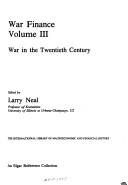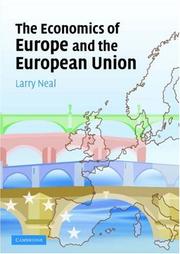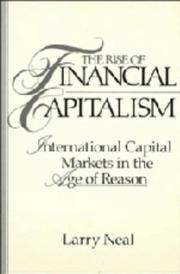| Listing 1 - 10 of 10 |
Sort by
|
Multi
ISBN: 9781107034174 9781107621213 9781139524858 Year: 2015 Publisher: Cambridge Cambridge University Press
Abstract | Keywords | Export | Availability | Bookmark
 Loading...
Loading...Choose an application
- Reference Manager
- EndNote
- RefWorks (Direct export to RefWorks)
World history --- Economics --- International finance --- History.

ISBN: 1852786639 Year: 1994 Volume: 12 Publisher: London Elgar
Abstract | Keywords | Export | Availability | Bookmark
 Loading...
Loading...Choose an application
- Reference Manager
- EndNote
- RefWorks (Direct export to RefWorks)
War finance --- Finances de guerre --- History --- Histoire --- Finances de guerreHistory
Book
ISBN: 0300153163 9786613601223 0300153171 1280571624 9780300153170 9780300153163 Year: 2012 Publisher: New Haven Yale University Press
Abstract | Keywords | Export | Availability | Bookmark
 Loading...
Loading...Choose an application
- Reference Manager
- EndNote
- RefWorks (Direct export to RefWorks)
Two of the greatest financial fiascos of all time took place at the same time and were instigated by two acquaintances: the Mississippi Bubble, on which John Law at first made a vast fortune and gained sway over French finances; and the South Sea Bubble, launched by Law and Thomas Pitt, Jr., Lord Londonderry, his main partner in England. This book tells the story of these two financial schemes from the letters and accounts of two leading personalities. Larry Neal, a distinguished economic historian, highlights the rationality of each person and also finds that the primitive exchanges of the day, though informal and completely unregulated, actually performed reasonably well.
Business cycles -- History -- 18th century. --- Financial crises -- History -- 18th century. --- Law, John, -- 1671-1729. --- South Sea Company. --- Business cycles --- Financial crises --- Finance --- Business & Economics --- Investment & Speculation --- History --- Law, John, --- Crashes, Financial --- Crises, Financial --- Financial crashes --- Financial panics --- Panics (Finance) --- Stock exchange crashes --- Stock market panics --- Economic cycles --- Economic fluctuations --- Law, --- Law, Jan, --- Compagnie du Sud --- Company of Merchants Trading to the South Seas --- Governour and Company of Merchants of Great Britain Trading to the South Seas and Other Parts of America, and for Encouraging the Fishery --- Crises --- Cycles --- Company of Merchants of Great Britain Trading to the South Seas and Other Parts of America, and for Encouraging the Fishery --- Economic schools --- Law, John

ISBN: 9780521683012 9780521864510 0521683017 0521864518 9780511754142 9780511649073 051164907X 9780511273230 0511273231 9780511274022 0511274025 0511754140 9780511271618 0511271611 9780511573231 0511573235 1107713951 Year: 2007 Publisher: Cambridge New York Cambridge University Press
Abstract | Keywords | Export | Availability | Bookmark
 Loading...
Loading...Choose an application
- Reference Manager
- EndNote
- RefWorks (Direct export to RefWorks)
This distinctive textbook combines comprehensive coverage of the key policy areas of the European Union with analysis of individual countries, including the recent accession countries and Turkey. Part I analyzes the economic bases for the rise of the European Union from its origins in the post-World War II recovery to its historic enlargement in 2004. Part II takes up the different nation-state perspectives on the EU's economic policies by looking in turn at all European countries, whether members of the EU or not. The book is unique in providing both an EU perspective and European nation-state perspective on the major policy issues which have arisen since the end of World War II, as well as putting the economic analysis into an historical narrative which emphasizes the responses of policy-makers to external shocks such as the Cold War, the oil shocks, German reunification, and the collapse of the Soviet Union.
330.940559
---
BPB0801
---
339.92

ISBN: 052138205X 0521457386 0511665121 9780521382052 9780511665127 9780521457385 Year: 1990 Publisher: Cambridge: Cambridge university press,
Abstract | Keywords | Export | Availability | Bookmark
 Loading...
Loading...Choose an application
- Reference Manager
- EndNote
- RefWorks (Direct export to RefWorks)
This work establishes the existence of a sophisticated and smoothly functioning system of financial markets in the mercantile states of northwestern Europe throughout the 1700s. Based on computer analysis of thousands of price quotes from the financial press of the eighteenth century, the results should force both historians and economists to re-evaluate their understanding of the evolution of financial markets and their importance for the economic developments of that era.
World history --- anno 1700-1799 --- 331.161.1 --- Geschiedenis van het overheidskrediet en van de overheidsschuld. --- Capital market --- International finance --- History. --- History --- Marché financier --- Finances internationales --- Histoire --- Great Britain --- Netherlands --- Capital market - Great Britain - History. --- Capital market - Netherlands - History. --- International finance - History. --- 331.13 --- 331.162.1 --- AA / International- internationaal --- Capital markets --- Market, Capital --- Finance --- Financial institutions --- Loans --- Money market --- Securities --- Crowding out (Economics) --- Efficient market theory --- Geschiedenis van de handel --- Geschiedenis van het overheidskrediet en van de overheidsschuld --- Geschiedenis van de financiële markten --- Arts and Humanities --- Capital market - Great Britain - History --- Capital market - Netherlands - History --- International finance - History --- marche international des capitaux --- internationale kapitaalmarkt
Multi
ISBN: 9783031562778 9783031562761 9783031562785 9783031562792 3031562771 Year: 2024 Publisher: Cham : Springer Nature Switzerland : Imprint: Palgrave Macmillan,
Abstract | Keywords | Export | Availability | Bookmark
 Loading...
Loading...Choose an application
- Reference Manager
- EndNote
- RefWorks (Direct export to RefWorks)
"The Louisiana Purchase is mostly remembered for the political acumen of Thomas Jefferson and Napoleon's pragmatism. This book shows that the grand bargain to double the size of the US depended on the financial engineering of two European merchant bankers. The bankers initiated a deal that avoided confrontation between the US and France and circumvented Britain's opposition. Perhaps this is why Jefferson stated that banks "are more dangerous than standing armies." - Rui Esteves, Professor, Geneva Graduate Institute "When Napoleon in 1803 offered to sell France's territorial claims in North America, the young United States did not have the money to buy. But it had something equally important: credit in the world of international finance. Neal's splendid contribution to financial history reveals how two enterprising European bankers used U.S. creditworthiness to structure the deal and arrange the financing that allowed the United States to double its territory and become a rising global power." - Richard Sylla, New York University "A complete reversal of what we thought we knew about the Louisiana purchase. As Professor Neal shows in this tour de maître, the financiers who masterminded the purchase did not 'arrange it'. They were really the puppeteers of the whole act." - Marc Flandreau, Howard S. Marks Professor of Economic History at University of Pennsylvania This book provides a comprehensive account of how the Louisiana Purchase of 1803 was financed. Where existing research has focused predominantly on the political and diplomatic significance of the Purchase, this book focuses on the 'forgotten financiers' of the Purchase - individuals from the US, France and the UK including Alexander Baring, Albert Gallatin, Pierre Cesar Labouchere and François Barbè-Marbois. Larry Neal is Emeritus Professor of Economics at the University of Illinois at Urbana-Champaign, Research Associate of the National Bureau of Economic Research, and Fellow of the Cliometrics Society. .
Politics --- Finance --- Economics --- International financial management --- World history --- History --- financieel management --- economie --- geschiedenis --- politiek --- economische geschiedenis --- sociale interventies --- internationale economie --- Finance. --- History. --- Economic history. --- International finance. --- Economics. --- Financial History. --- Economic History. --- International Finance. --- Political Economy and Economic Systems.
Book
ISBN: 9780521895170 9780511757419 9780521154765 9780511757341 0511757344 0521895170 0511756925 9780511756924 1107201446 0511847084 0521154766 1282630970 9786612630972 0511757271 0511757069 0511757204 0511757417 Year: 2009 Publisher: Cambridge, UK New York Cambridge University Press
Abstract | Keywords | Export | Availability | Bookmark
 Loading...
Loading...Choose an application
- Reference Manager
- EndNote
- RefWorks (Direct export to RefWorks)
Collectively, mankind has never had it so good despite periodic economic crises of which the current sub-prime crisis is merely the latest example. Much of this success is attributable to the increasing efficiency of the world's financial institutions as finance has proved to be one of the most important causal factors in economic performance. In a series of insightful essays, financial and economic historians examine how financial innovations from the seventeenth century to the present have continually challenged established institutional arrangements, forcing change and adaptation by governments, financial intermediaries, and financial markets. Where these have been successful, wealth creation and growth have followed. When they failed, growth slowed and sometimes economic decline has followed. These essays illustrate the difficulties of co-ordinating financial innovations in order to sustain their benefits for the wider economy, a theme that will be of interest to policy makers as well as economic historians.
International finance --- World history --- anno 1600-1699 --- anno 1700-1799 --- anno 1800-1999 --- Financial institutions --- Capital market --- Banks and banking --- AA / International- internationaal --- 331.160 --- 332.109 --- Agricultural banks --- Banking --- Banking industry --- Commercial banks --- Depository institutions --- Finance --- Money --- Capital markets --- Market, Capital --- Loans --- Money market --- Securities --- Crowding out (Economics) --- Efficient market theory --- Financial intermediaries --- Lending institutions --- Associations, institutions, etc. --- Financiële geschiedenis: algemeenheden. --- Financiële geschiedenis: algemeenheden --- Financial institutions. --- Capital market. --- Banks and banking. --- Arts and Humanities --- History
Book
ISBN: 9781107019638 9781107019645 9781107036949 1107036941 1107019648 110701963X 9781139095105 9781107583351 9781139095099 9781107583283 9781107584594 Year: 2014 Publisher: Cambridge: Cambridge university press,
Abstract | Keywords | Export | Availability | Bookmark
 Loading...
Loading...Choose an application
- Reference Manager
- EndNote
- RefWorks (Direct export to RefWorks)
"Modern economic growth, defined as a sustained rise in per capita income (Kuznets 1966C001-025), has created higher levels of prosperity for many more people on earth than was ever thought possible before it began. Moreover, it began not so very long ago, perhaps as late as the middle of the nineteenth century and certainly not before the end of the seventeenth century"--
Ancient history --- World history --- Capitalism --- Economic History --- History --- Economic history. --- Capitalisme --- Histoire économique --- History. --- Histoire --- Economic history --- Histoire économique --- Histoire économique. --- Histoire. --- Business & economics --- 330.52 --- 338.313 --- AA / International- internationaal --- Liberaal systeem. Neo-liberalisme. Theorie van de onderhandeling. --- Kapitalisme. --- Economic conditions --- History, Economic --- Liberaal systeem. Neo-liberalisme. Theorie van de onderhandeling --- Kapitalisme --- Economics --- Capitalism - History --- Histoire économique.
Multi
ISBN: 1139892894 1107424836 1107422809 1107419654 1139856030 1107417090 1107420857 1107418348 1107039010 1299842178 9781107417090 9781139856034 9781107418349 9781107039018 9781107419650 9781107420854 9781139892896 9781107424838 9781107422803 Year: 2013 Publisher: Cambridge
Abstract | Keywords | Export | Availability | Bookmark
 Loading...
Loading...Choose an application
- Reference Manager
- EndNote
- RefWorks (Direct export to RefWorks)
Financial capitalism emerged in a recognisably modern form in late seventeenth- and eighteenth-century Great Britain. Following the seminal work of Douglass C. North and Barry R. Weingast (1989), many scholars have concluded that the 'credible commitment' that was provided by parliamentary backing of government as a result of the Glorious Revolution of 1688 provided the key institutional underpinning on which modern public finances depend. In this book, a specially commissioned group of historians and economists examine and challenge the North and Weingast thesis to show that multiple commitment mechanisms were necessary to convince public creditors that sovereign debt constituted a relatively accessible, safe and liquid investment vehicle. Questioning Credible Commitment provides academics and practitioners with a broader understanding of the origins of financial capitalism, and, with its focus on theoretical and policy frameworks, shows the significance of the debate to current macroeconomic policy making.
Finance, Public --- Capital --- Credit --- History. --- Europe --- Economic policy. --- Borrowing --- Finance --- Money --- Loans --- Capital assets --- Fixed assets --- Economics --- Capitalism --- Infrastructure (Economics) --- Wealth --- Cameralistics --- Public finance --- Currency question --- Business, Economy and Management --- Public finances --- History --- E-books --- World history --- anno 1500-1799 --- anno 1800-1899
Book
ISBN: 9781612481111 1612481116 9781612481104 1612481108 Year: 2014 Publisher: Kirksville, Missouri
Abstract | Keywords | Export | Availability | Bookmark
 Loading...
Loading...Choose an application
- Reference Manager
- EndNote
- RefWorks (Direct export to RefWorks)
Prisoners --- Prisons --- Dungeons --- Gaols --- Penitentiaries --- Correctional institutions --- Imprisonment --- Prison-industrial complex --- Convicts --- Imprisoned persons --- Incarcerated persons --- Prison inmates --- Inmates of institutions --- Persons --- Officials and employees --- Inmates --- Neal, Larry Edmund, --- Missouri State Penitentiary. --- Missouri.
| Listing 1 - 10 of 10 |
Sort by
|

 Search
Search Feedback
Feedback About UniCat
About UniCat  Help
Help News
News